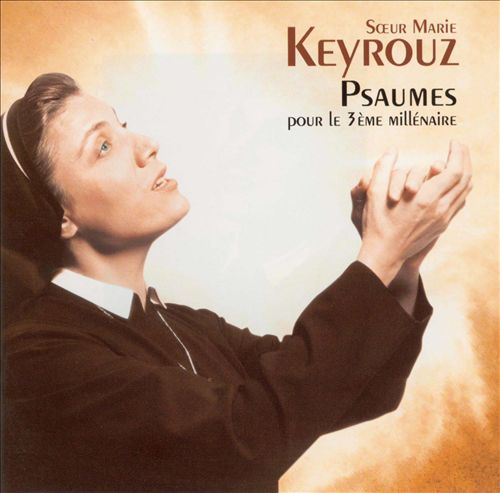Psalms for the 3 Millenium
| 25,00 ą |
-
Mina al amaq
00:39
Sister Marie Keyrouz – Mina al amaq - Psalms for the third Millenium
-
Izoi / Alyawm
00:52
Sister Marie Keyrouz– Izoi / Alyawm - Psalms for the third Millenium
-
Anta
00:26
Sister Marie Keyrouz – Anta - Psalms for the third Millenium
-
Atiru
01:32
Sister Marie Keyrouz – Atiru - Psalms for the third Millenium
-
Gnen abdeh
00:33
Sister Marie Keyrouz – Gnen abdeh - Psalms for the third Millenium
-
A jbinak el eklil
00:34
Sister Marie Keyrouz – A jbinak el eklil - Psalms for the third Millenium
-
Rabbah
00:47
Sister Marie Keyrouz – Rabbah - Psalms for the third Millenium
-
Amamaka
00:55
Sister Marie Keyrouz – Amamaka - Psalms for the third Millenium
-
Touba
01:29
Sister Marie Keyrouz – Touba - Psalms for the third Millenium
PSALMS FOR THE 3 MILLENNIUM
These Psalms for the third Millenium comprise canticles, prayers and thanksgiving. They are intended to be hymns to hope and echoes of God's endless love for man.
It matters little whether listeners are religious, believers, agnostics or atheists, whether they come from the west or the East, or what rite they may practice :
they are loved by God who, through the grace of these hymns, offers them His secrets so that they may meet Him in the hearts of their neighbours, however they may define their religions, rites, country or musical culture.
These Psalms are religiously, liturgically,spiritually or simply humanly inspired lyrical poems.
They derive their essential character from the earliest musical themes of traditional Jewish, Byzantine and Syriac chant and the subtlest musical modes of classical Arabic sacred music.
Challenged with the devastating range of choice before us, we have opted here for the constructive wealth of a peaceful encounter.
For the first time in the history of music, the harp and the zither embrace, and the strings of East and West are transformed into a lyre of love to transport our souls towards our Creator.
The nay dialogues with the flute, singing in unison the theme of the Syriac Passion of Saint Ephrem ( fourth century) ; the oboe and the cello recall the most yearning Byzantine themes ( usually sung a cappella ) so that the wind instruments may hymn the heavenly glory.
The instrumentalists who have joigned forces to make this recording come from all over the world and from all cultures. They are of every colour and religion.
They associate their music with the human voice to bring the sacred text to its zenith, where human beings meet in order to be workshop of the divine image.
The Eastern orchestra accompanies the voice in unison with all the wealth of fioritura and the subtleties of untempered intervals, while inviting the Western orchestra to display its own colours and create a context favourable for singing, ranging throughout the emotions which give the text and the voice the fullness of its human and spiritual dimensions.
With these psalms, we hope to break down human and musical frontiers, to eradicate the taboos affecting the interpretation of eastern music, and to bring about the meeting men have waited for so long by means of beauty and the sacred.
Sister Marie Keyrouz
- ←
- 1
- →
